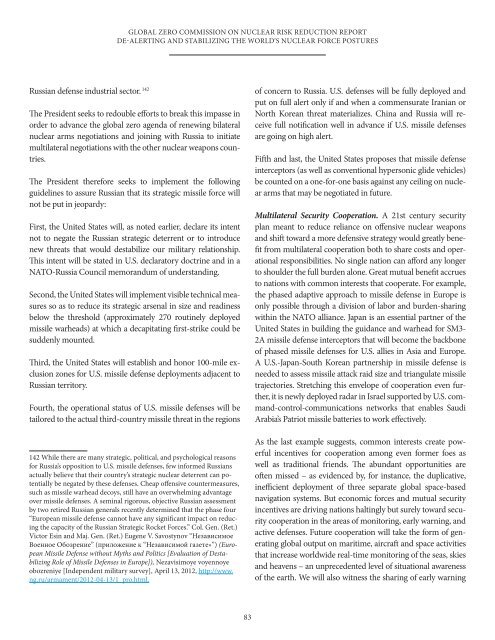global_zero_commission_on_nuclear_risk_reduction_report
global_zero_commission_on_nuclear_risk_reduction_report
global_zero_commission_on_nuclear_risk_reduction_report
Create successful ePaper yourself
Turn your PDF publications into a flip-book with our unique Google optimized e-Paper software.
GLOBAL ZERO COMMISSION ON NUCLEAR RISK REDUCTION REPORTDE-ALERTING AND STABILIZING THE WORLD’S NUCLEAR FORCE POSTURESRussian defense industrial sector. 142The President seeks to redouble efforts to break this impasse inorder to advance the <str<strong>on</strong>g>global</str<strong>on</strong>g> <str<strong>on</strong>g>zero</str<strong>on</strong>g> agenda of renewing bilateral<strong>nuclear</strong> arms negotiati<strong>on</strong>s and joining with Russia to initiatemultilateral negotiati<strong>on</strong>s with the other <strong>nuclear</strong> weap<strong>on</strong>s countries.The President therefore seeks to implement the followingguidelines to assure Russian that its strategic missile force willnot be put in jeopardy:First, the United States will, as noted earlier, declare its intentnot to negate the Russian strategic deterrent or to introducenew threats that would destabilize our military relati<strong>on</strong>ship.This intent will be stated in U.S. declaratory doctrine and in aNATO-Russia Council memorandum of understanding.Sec<strong>on</strong>d, the United States will implement visible technical measuresso as to reduce its strategic arsenal in size and readinessbelow the threshold (approximately 270 routinely deployedmissile warheads) at which a decapitating first-strike could besuddenly mounted.Third, the United States will establish and h<strong>on</strong>or 100-mile exclusi<strong>on</strong>z<strong>on</strong>es for U.S. missile defense deployments adjacent toRussian territory.Fourth, the operati<strong>on</strong>al status of U.S. missile defenses will betailored to the actual third-country missile threat in the regi<strong>on</strong>s142 While there are many strategic, political, and psychological reas<strong>on</strong>sfor Russia’s oppositi<strong>on</strong> to U.S. missile defenses, few informed Russiansactually believe that their country’s strategic <strong>nuclear</strong> deterrent can potentiallybe negated by these defenses. Cheap offensive countermeasures,such as missile warhead decoys, still have an overwhelming advantageover missile defenses. A seminal rigorous, objective Russian assessmentby two retired Russian generals recently determined that the phase four“European missile defense cannot have any significant impact <strong>on</strong> reducingthe capacity of the Russian Strategic Rocket Forces.” Col. Gen. (Ret.)Victor Esin and Maj. Gen. (Ret.) Eugene V. Savostynov “НезависимоеВоенное Обозрение” (приложение к “Независимой газете»”) (EuropeanMissile Defense without Myths and Politics [Evaluati<strong>on</strong> of DestabilizingRole of Missile Defenses in Europe]), Nezavisimoye voyennoyeobozreniye [Independent military survey], April 13, 2012, http://www.ng.ru/armament/2012-04-13/1_pro.html.of c<strong>on</strong>cern to Russia. U.S. defenses will be fully deployed andput <strong>on</strong> full alert <strong>on</strong>ly if and when a commensurate Iranian orNorth Korean threat materializes. China and Russia will receivefull notificati<strong>on</strong> well in advance if U.S. missile defensesare going <strong>on</strong> high alert.Fifth and last, the United States proposes that missile defenseinterceptors (as well as c<strong>on</strong>venti<strong>on</strong>al hypers<strong>on</strong>ic glide vehicles)be counted <strong>on</strong> a <strong>on</strong>e-for-<strong>on</strong>e basis against any ceiling <strong>on</strong> <strong>nuclear</strong>arms that may be negotiated in future.Multilateral Security Cooperati<strong>on</strong>. A 21st century securityplan meant to reduce reliance <strong>on</strong> offensive <strong>nuclear</strong> weap<strong>on</strong>sand shift toward a more defensive strategy would greatly benefitfrom multilateral cooperati<strong>on</strong> both to share costs and operati<strong>on</strong>alresp<strong>on</strong>sibilities. No single nati<strong>on</strong> can afford any l<strong>on</strong>gerto shoulder the full burden al<strong>on</strong>e. Great mutual benefit accruesto nati<strong>on</strong>s with comm<strong>on</strong> interests that cooperate. For example,the phased adaptive approach to missile defense in Europe is<strong>on</strong>ly possible through a divisi<strong>on</strong> of labor and burden-sharingwithin the NATO alliance. Japan is an essential partner of theUnited States in building the guidance and warhead for SM3-2A missile defense interceptors that will become the backb<strong>on</strong>eof phased missile defenses for U.S. allies in Asia and Europe.A U.S.-Japan-South Korean partnership in missile defense isneeded to assess missile attack raid size and triangulate missiletrajectories. Stretching this envelope of cooperati<strong>on</strong> even further,it is newly deployed radar in Israel supported by U.S. command-c<strong>on</strong>trol-communicati<strong>on</strong>snetworks that enables SaudiArabia’s Patriot missile batteries to work effectively.As the last example suggests, comm<strong>on</strong> interests create powerfulincentives for cooperati<strong>on</strong> am<strong>on</strong>g even former foes aswell as traditi<strong>on</strong>al friends. The abundant opportunities areoften missed – as evidenced by, for instance, the duplicative,inefficient deployment of three separate <str<strong>on</strong>g>global</str<strong>on</strong>g> space-basednavigati<strong>on</strong> systems. But ec<strong>on</strong>omic forces and mutual securityincentives are driving nati<strong>on</strong>s haltingly but surely toward securitycooperati<strong>on</strong> in the areas of m<strong>on</strong>itoring, early warning, andactive defenses. Future cooperati<strong>on</strong> will take the form of generating<str<strong>on</strong>g>global</str<strong>on</strong>g> output <strong>on</strong> maritime, aircraft and space activitiesthat increase worldwide real-time m<strong>on</strong>itoring of the seas, skiesand heavens – an unprecedented level of situati<strong>on</strong>al awarenessof the earth. We will also witness the sharing of early warning83


